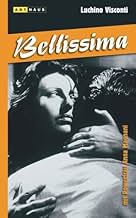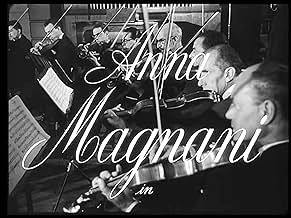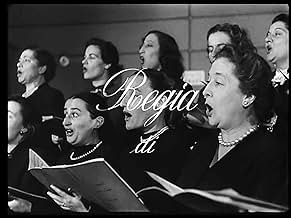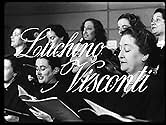IMDb-BEWERTUNG
7,7/10
5877
IHRE BEWERTUNG
Eine Frau aus der Unterschicht, die verzweifelt versucht, ihre Tochter zum Film zu bringen.Eine Frau aus der Unterschicht, die verzweifelt versucht, ihre Tochter zum Film zu bringen.Eine Frau aus der Unterschicht, die verzweifelt versucht, ihre Tochter zum Film zu bringen.
- Auszeichnungen
- 1 Gewinn & 1 Nominierung insgesamt
Liliana Mancini
- Iris
- (as Iris)
Vittorio Musy Glori
- Self
- (as Vittorio Glori)
Empfohlene Bewertungen
"Bellissima" is structured in a circular and ephemeral plot. Their conflict, which becomes stronger as a situation, is mimesis of reality, of stories so close and common but diversified. In short: the human desire to overcome poverty, even if we stimulate exploitation even more.
The timeless character of this film made in 1951 by Luchino Visconti, is already clear in its synopsis: The story of Maddalena (a nurse), who inscribes his daughter Maria, in a contest that aims to elect the most beautiful girl in Italy. The contest represents a ticket to give the daughter a life that oscillates between dignity and luxury, being that mother-protagonist, ready to everything to guarantee the victory of the daughter.
In a large part of this story that sometimes takes situations and absurd moments, facing a desire that borders the limitations of vision, rationality and absurdity when showing the starting points, play and finalize this saga. That is drawn by a mother motivated by the future of her daughter, this dramatic dimension that is characteristic to the film, if diluted wisely in moments of comedy. Maddalena's attitudes are laughable, all the more so as in the lack of artistic talent of her daughter. This laughs at the other, the role of a fool that plays this mother not to notice in the daughter who lacks other attributes, and the belief that the beauty of the girl, added to the interference of this mother, as in trying to buy the jurors or get someone inside the Production of the film that highlights the test of Maria, that this sum can interfere in the result and consecrate in the victory of Maddalena through the small daughter.
With all the merits of a timeless story, and without regret the fact that the director had in hand a material very close to the neo-realist films that consecrated him, that is, to have something very close to the style that was customary to do, but that is Rejected in "Bellissima", approaching this story through the realistic bias, in which, personally, I consider that it was desirous to the producers of the film and to the director to present a more comprehensive aspect of the fable, considering the common character of this story, that happens and repeats itself In life, and which is now reflected on canvas, but which, in abandoning a reflection of this realism pertaining to a certain social reality, generates a filmic approach that equates maternal desires, however, disproportionate and invalid in face of class differences and consequently incapable of generating Changes, or results, how can you compete with a family that already has a wide advantage? This inequality of classes is mentioned and treated very superficially in the small plots in which they are presented, this minimizes the strength and potentiality of Visconti and Bellissima, since the approach in which it is presented (its form), makes it impossible for itself speech. The struggle to overcome class differences, through methods that reinforce and contribute to these differences. In truth, the mother does not struggle to overcome anything, she wants only to belong to something, and in the end, when she perceives this world of cruel differences that she admired and in which she ended up collaborating, it becomes, then, the moment of rationality and revolt of Maddalena. In portraying cinema as a microcosm of a prosperous world in advantageous possibilities, Visconti satirizes the film industry itself and human innocence in the face of its belief in possibility and belonging. This belief that induces the ability to use mechanisms, but is already dominated by commercial interests, which among others, result in the strengthening of class differences and simulate a fantasy world, such as the cinema and its benefits.
The entire film is anchored by the magnetic and fascinating performance of Anna Magnani, who fills the entire screen with a fiery vitality and intensity that is almost impossible to look away. In 1951, she was one of the queens of Italian cinema and was already echoing all over the world. Anna was the favorite actress of Bette Davis, and Bette considered Anna's performance in "Bellissima" as: brilliant, uninhibited and full of immense power. There is hardly a moment in the movie where it is still or silent. Visconti, almost exclusively, records Anna in medium and full planes, giving her ample room for compositions and promoting seams from one end of the frame to the other.
Between several scenes of fade-in and fade-out that stitch together the film, between jumps of episodic events that collaborate for the construction and the outcome of the plot, it calls the photographic proposal of Piero Portalupi and Paul Ronald, who basically establish a climate of life Obscure in the apartment of Maddalena, in contrast, the reflectors and dazzle of lights of the "Cinecittà", a directing of light that directs not only the convicted desire of Maddalena, but with only enlightened path that offers a perspective, a way out that life between Shadows Another great moment of mastery of this photograph is in the game between half light that illuminates faces or that highlight one among many others, a clear allusion to the pursuit of brilliance and own light that dialogue and much for the construction of "Beautiful".
Although not the most interesting film of Visconti, and leaving aside many of the brands that have consecrated it, "Bellissima" is an interesting work and that dialogues with the contemporary world, and possibly dialogues with the future world, since between the social differences Which we both struggle to overcome, are often unconsciously reinforced through a selfish struggle that seeks only to save some and not realize that it will only result when we understand the need for a whole. Luchino Visconti was able to write for our eyes, an important social and cultural document that reflects on yesterday, analyzes the present and provides paths for tomorrow.
The timeless character of this film made in 1951 by Luchino Visconti, is already clear in its synopsis: The story of Maddalena (a nurse), who inscribes his daughter Maria, in a contest that aims to elect the most beautiful girl in Italy. The contest represents a ticket to give the daughter a life that oscillates between dignity and luxury, being that mother-protagonist, ready to everything to guarantee the victory of the daughter.
In a large part of this story that sometimes takes situations and absurd moments, facing a desire that borders the limitations of vision, rationality and absurdity when showing the starting points, play and finalize this saga. That is drawn by a mother motivated by the future of her daughter, this dramatic dimension that is characteristic to the film, if diluted wisely in moments of comedy. Maddalena's attitudes are laughable, all the more so as in the lack of artistic talent of her daughter. This laughs at the other, the role of a fool that plays this mother not to notice in the daughter who lacks other attributes, and the belief that the beauty of the girl, added to the interference of this mother, as in trying to buy the jurors or get someone inside the Production of the film that highlights the test of Maria, that this sum can interfere in the result and consecrate in the victory of Maddalena through the small daughter.
With all the merits of a timeless story, and without regret the fact that the director had in hand a material very close to the neo-realist films that consecrated him, that is, to have something very close to the style that was customary to do, but that is Rejected in "Bellissima", approaching this story through the realistic bias, in which, personally, I consider that it was desirous to the producers of the film and to the director to present a more comprehensive aspect of the fable, considering the common character of this story, that happens and repeats itself In life, and which is now reflected on canvas, but which, in abandoning a reflection of this realism pertaining to a certain social reality, generates a filmic approach that equates maternal desires, however, disproportionate and invalid in face of class differences and consequently incapable of generating Changes, or results, how can you compete with a family that already has a wide advantage? This inequality of classes is mentioned and treated very superficially in the small plots in which they are presented, this minimizes the strength and potentiality of Visconti and Bellissima, since the approach in which it is presented (its form), makes it impossible for itself speech. The struggle to overcome class differences, through methods that reinforce and contribute to these differences. In truth, the mother does not struggle to overcome anything, she wants only to belong to something, and in the end, when she perceives this world of cruel differences that she admired and in which she ended up collaborating, it becomes, then, the moment of rationality and revolt of Maddalena. In portraying cinema as a microcosm of a prosperous world in advantageous possibilities, Visconti satirizes the film industry itself and human innocence in the face of its belief in possibility and belonging. This belief that induces the ability to use mechanisms, but is already dominated by commercial interests, which among others, result in the strengthening of class differences and simulate a fantasy world, such as the cinema and its benefits.
The entire film is anchored by the magnetic and fascinating performance of Anna Magnani, who fills the entire screen with a fiery vitality and intensity that is almost impossible to look away. In 1951, she was one of the queens of Italian cinema and was already echoing all over the world. Anna was the favorite actress of Bette Davis, and Bette considered Anna's performance in "Bellissima" as: brilliant, uninhibited and full of immense power. There is hardly a moment in the movie where it is still or silent. Visconti, almost exclusively, records Anna in medium and full planes, giving her ample room for compositions and promoting seams from one end of the frame to the other.
Between several scenes of fade-in and fade-out that stitch together the film, between jumps of episodic events that collaborate for the construction and the outcome of the plot, it calls the photographic proposal of Piero Portalupi and Paul Ronald, who basically establish a climate of life Obscure in the apartment of Maddalena, in contrast, the reflectors and dazzle of lights of the "Cinecittà", a directing of light that directs not only the convicted desire of Maddalena, but with only enlightened path that offers a perspective, a way out that life between Shadows Another great moment of mastery of this photograph is in the game between half light that illuminates faces or that highlight one among many others, a clear allusion to the pursuit of brilliance and own light that dialogue and much for the construction of "Beautiful".
Although not the most interesting film of Visconti, and leaving aside many of the brands that have consecrated it, "Bellissima" is an interesting work and that dialogues with the contemporary world, and possibly dialogues with the future world, since between the social differences Which we both struggle to overcome, are often unconsciously reinforced through a selfish struggle that seeks only to save some and not realize that it will only result when we understand the need for a whole. Luchino Visconti was able to write for our eyes, an important social and cultural document that reflects on yesterday, analyzes the present and provides paths for tomorrow.
A wonderful, poignant masterpiece by the great Visconti and Anna-the-Great-Magnani. On the surface, it is a simple story about a mother's obsession to use her little daughter's appearance to escape the poverty of post-war Italy. What transpires is the cruel truth about the beauty- and illusion-making industry (cinema), with all its inherent cynicism, at a time when hunger for the daily bread was equaled by hunger for fantasy and beauty.
I've seen this movie only once, ages ago, and it still remains with me as one of the most unforgettable films I have ever seen. In a world that has seen hundreds of thousands of films that is no small feat.
I've seen this movie only once, ages ago, and it still remains with me as one of the most unforgettable films I have ever seen. In a world that has seen hundreds of thousands of films that is no small feat.
In a post-war Italy, Maddalena Cecconi (Anna Magnani) is a woman from the lower classes abused by her husband Spartaco Cecconi (Gastone Renzelli), who is obsessed to make her young daughter Maria (Tina Apicella) a star in the cinema industry. She expects a better life for Maria, and she sacrifices her marriage and her savings paying interpretation and ballet teachers, dress, hairdresser and bribe for the small time crook Alberto Annovazzi (Walter Chiari) to make her dream come true. When the director sees the test of Maria, Maddalena realizes the reality and cruelty of the entertainment industry.
"Belissima" is a beautiful tale of disillusion. Anna Magnani has a magnificent interpretation in a role of a very poor mother and frustrated woman, spanked by her husband, trying to give a better life for her young daughter. Living nearby a movie theater, she sees the opportunity when a famous director is chasing a young talent for his next movie. Her characters gives the best effort within her short culture and vision trying to make her dream comes true, being very touching the moment when her dreams are shattered. The direction of Luchino Visconti is precise and flawless as usual, and the story is very real and credible. My vote is eight.
Title (Brazil): "Belíssima" ("Very Beautiful")
"Belissima" is a beautiful tale of disillusion. Anna Magnani has a magnificent interpretation in a role of a very poor mother and frustrated woman, spanked by her husband, trying to give a better life for her young daughter. Living nearby a movie theater, she sees the opportunity when a famous director is chasing a young talent for his next movie. Her characters gives the best effort within her short culture and vision trying to make her dream comes true, being very touching the moment when her dreams are shattered. The direction of Luchino Visconti is precise and flawless as usual, and the story is very real and credible. My vote is eight.
Title (Brazil): "Belíssima" ("Very Beautiful")
After Rome's Cinecitta Studios announces a call to cast a young girl in a movie, Maddalena Cecconi (Anna Magnani) joins a horde of other parents (mostly mothers) as she drags her daughter Maria (Tina Apicella) to the audition. Although Maria is plain, talentless, and clearly uninterested, Maddalena still pushes through in the hopes Maria raises the family to a higher station in life.
In the film's opening scene during the mass audition, director Luchino Visconti smartly uses an overhead shot of the families crowding into the studio door, much like cattle being crowded into a slaughterhouse. Like the Hollywood classic "Sunset Boulevard" released only a year earlier, "Bellissima" is a creation by the film industry about how horribly the film industry treats people. Although the story occurs at a certain place and time, its message is universal and timeless: beware of the belief that "stardom" will make life better; the relentless pursuit of it could actually make life worse.
The film begins well and its middle section is enjoyable though unexceptional. But they both build up to a final half-hour that is mesmerizing. Its denouement begins with a very clever scene involving a film editor who used to be a renowned actress. From that point and incidents that follow, Maddalena has revelations that are heart-rending and her actions are shocking.
And is it possible to praise La Grande Magnani any more than she has already been praised? I'll try. It has been said that truly great actors have the ability to captivate audiences even when reading aloud the contents of a telephone directory. Magnani could go even further than this. She could captivate an audience even while silently listening to another read to her the contents of said directory. Her face registers so much. Her performance in this film is rightly praised as one of her best. That says a lot. - dbamateurcritic
OUTSTANDING ACHIEVEMENT: Acting by Anna Magnani.
In the film's opening scene during the mass audition, director Luchino Visconti smartly uses an overhead shot of the families crowding into the studio door, much like cattle being crowded into a slaughterhouse. Like the Hollywood classic "Sunset Boulevard" released only a year earlier, "Bellissima" is a creation by the film industry about how horribly the film industry treats people. Although the story occurs at a certain place and time, its message is universal and timeless: beware of the belief that "stardom" will make life better; the relentless pursuit of it could actually make life worse.
The film begins well and its middle section is enjoyable though unexceptional. But they both build up to a final half-hour that is mesmerizing. Its denouement begins with a very clever scene involving a film editor who used to be a renowned actress. From that point and incidents that follow, Maddalena has revelations that are heart-rending and her actions are shocking.
And is it possible to praise La Grande Magnani any more than she has already been praised? I'll try. It has been said that truly great actors have the ability to captivate audiences even when reading aloud the contents of a telephone directory. Magnani could go even further than this. She could captivate an audience even while silently listening to another read to her the contents of said directory. Her face registers so much. Her performance in this film is rightly praised as one of her best. That says a lot. - dbamateurcritic
OUTSTANDING ACHIEVEMENT: Acting by Anna Magnani.
If you see only one film by Anna Magnani, see BELLISSIMA. The is "La Magnani" at her comic best. Get the video with English subtitles because even if your italian is good, the verbal onslaught is thick and fast. Preferably one should see this film on the big screen to get the full impact of Magnani's performance. She plays a stage mother who is trying to get her young, tiny little girl into the movies. Magnani's warmth, wit, slyness and sheer volcanic beauty leap from the screen. I am amazed that Hollywood has not re-made this film. It would be the perfect vehicle for Barbra Streisand or Bette Midler and would assure them of an Oscar nomination. Unlike her English language roles, such as "The Rose Tattoo" or "The Secret of Santa Vittoria", in BELLISSIMA Magnani acts in her native italian voice. It makes all the difference in the world. When she acted in English, she was stilted and restrained; the language barrier, although she made super-human, heroic efforts to master English, is nonetheless felt. But in her native tongue, Magnani lets loose with a bravura performance. I defy anyone not to fall in love with her after watching BELLISSIMA.
Wusstest du schon
- WissenswertesIn the final scene, Anna Magnani hears the film playing outside her room and remarks that she hears Burt Lancaster. Magnani would win an Oscar four years later for The Rose Tattoo, in which she would costar with Lancaster.
- VerbindungenEdited into Al Centro del cinema (2015)
Top-Auswahl
Melde dich zum Bewerten an und greife auf die Watchlist für personalisierte Empfehlungen zu.
- How long is Bellissima?Powered by Alexa
Details
- Erscheinungsdatum
- Herkunftsland
- Sprache
- Auch bekannt als
- Die Schönste
- Drehorte
- Ristorante Al Biondo Tevere, Via Ostiense, 178, Roma RM, Italien(Trattoria by the River Tiber)
- Produktionsfirma
- Weitere beteiligte Unternehmen bei IMDbPro anzeigen
- Laufzeit
- 1 Std. 55 Min.(115 min)
- Farbe
- Seitenverhältnis
- 1.37 : 1
Zu dieser Seite beitragen
Bearbeitung vorschlagen oder fehlenden Inhalt hinzufügen

















